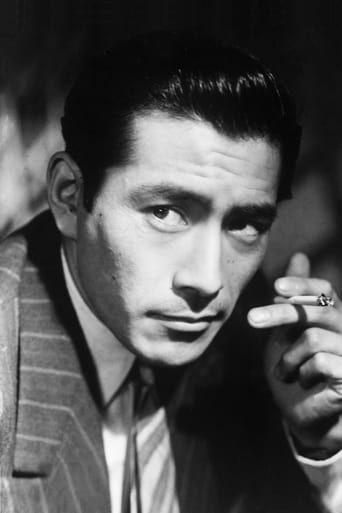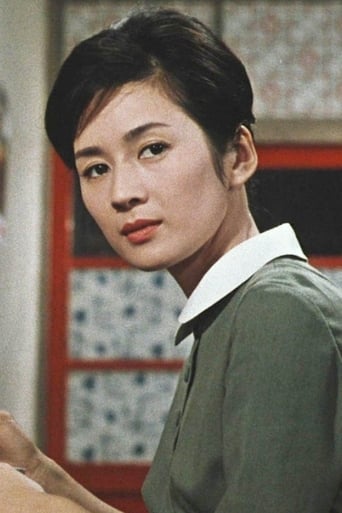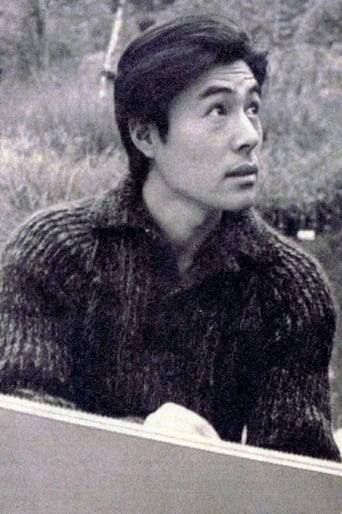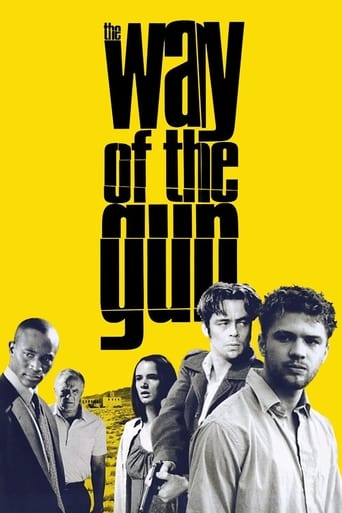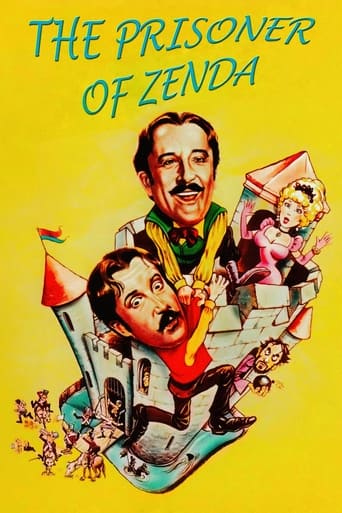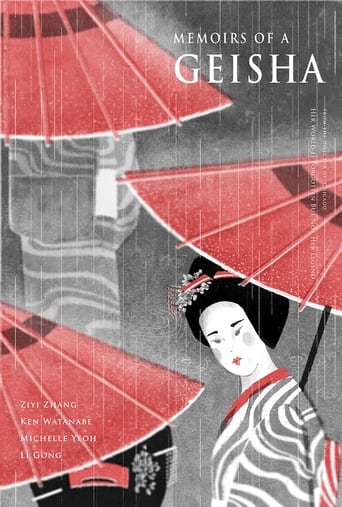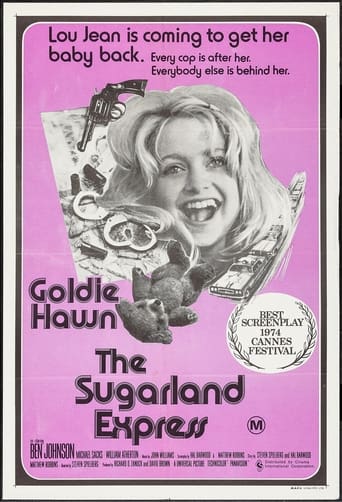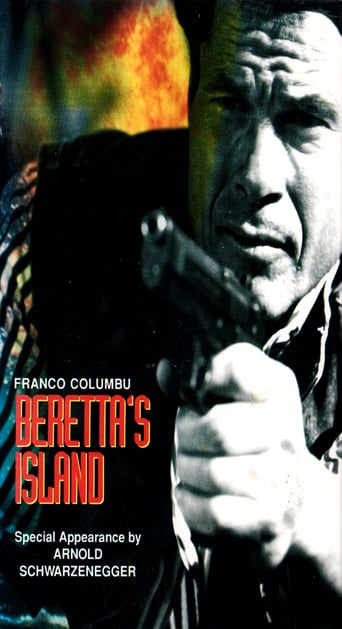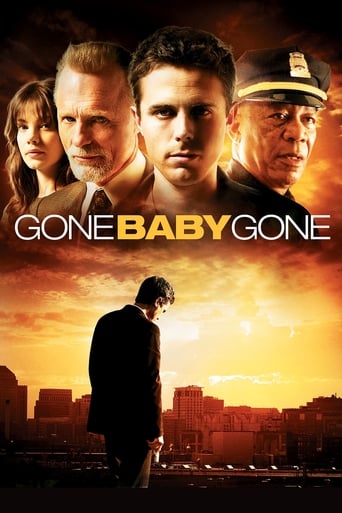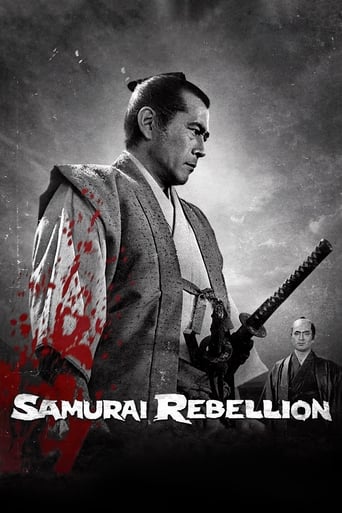
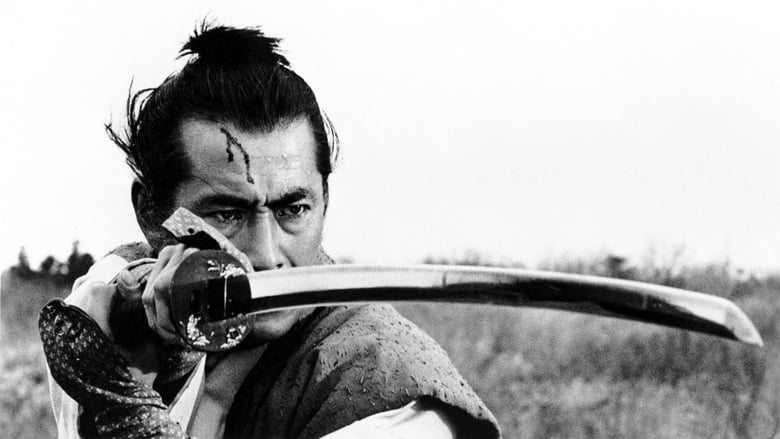
Samurai Rebellion (1967)
The mother of a feudal lord's only heir is kidnapped away from her husband by the lord. The husband and his samurai father must decide whether to accept the unjust decision, or risk death to get her back.
Watch Trailer
Cast


Similar titles
Reviews
I love this movie so much
Sadly Over-hyped
Wow! What a bizarre film! Unfortunately the few funny moments there were were quite overshadowed by it's completely weird and random vibe throughout.
The movie's neither hopeful in contrived ways, nor hopeless in different contrived ways. Somehow it manages to be wonderful
Viewed on DVD. Restoration = ten (10) stars; costumes = nine (9) stars; cinematography = eight (8) stars. Director Masaki Kobayashi has created a film comprising not much more than postures and posturing. (Even shots of a feudal lord's castle (only the top half is shown) look suspiciously like a collection of still-photo "postures"!) It is prodding and much too long. Actors/actresses seem trapped by the director's fixation on exquisite costumes worn in splendid settings (this is a black & white film that "cries out" for color) rather than having depth added to mostly cardboard, two-dimensional characters. The result is that little, if any, rapport with the audience is allowed to develop (except for the leading actor to some extent), and the viewer ends up with less than minimal interest in what happens to the protagonists. Kobayashi ends matters with what has got to be one of the longest (and silliest) action death scenes in the history of the cinema complete with way-over-the-top hammy acting by the lead actor. (Thank heavens (O-Kaga-Sama De!) for the fast-forward button on player remotes!) Cinematography (wide screen, black & white) is excellent and appears to be purposely dynamic (lots of zooming and tracking shots) to help counter the static nature of postured scenes. Deep-focus interior lighting is also outstanding. There is no film score. Instead, the sound track mostly consists of drumming ensembles complete with typical cries from the players (great performances, but a bit disconcerting). In case you may be wondering about the film's title as written in Romaji Japanese ("Joiuchi: Hairyou Tsuma Shimatsu"), it literally says nothing about Samurai or a rebellion; but this off-the-wall translation has come to be universally referred to as "Samurai Rebellion" (or "Rebellion"). Worth watching, but only with plenty of caffeine (and a fully functioning remote). WILLIAM FLANIGAN, PhD.
In Masaki Kobayashi's Samurai Rebellion, Toshiro plays a skilled swordsman named Isaburo, a silent type who places honour and family above everything else. In many ways, Isaburo is like the humble American cowboy of old, and the Japanese samurai movies themselves share many of the same qualities of the Western - an almost mythical historical setting where good battles bad, albeit often on a larger scale. Yet the samurai movies seem infinitely more complex beneath the surface, satirising a time where feudal lords reigned over vast areas of land and the common-folk and nobles were kept in line by social rigidity.Isaburo has lived most of his life by this code. Having suffered in silence following years being henpecked by his wife who he married on the order of his daimyo, he has nonetheless proved himself to be the greatest swordsman in the land, winning the respect of his superiors in the process. It is because of this reputation that his son Yogoro (Go Kato) is chosen as the husband for their lords ex- concubine Lady Ichi (Yoko Tsukasa), who had previously given birth to a potential heir but now banished from her lords castle after disgracing herself. Isaburo reluctantly accepts the proposal and the marriage surprisingly turns out to be a loving one. But when his heir dies unexpectedly and Ichi's child moves next in line, the lord demands that Ichi be returned to the castle. Yogoro refuses and, moved by their true love, Isaburo takes a stand next to his son.Even when they aren't inspired by the Bard, these types of movies always have a Shakespearian quality. As all the pieces are carefully moved into place for the final showdown, Samurai Rebellion builds towards inevitable Greek tragedy. There are no huge Kurosawa-esque battles here, but plenty of inner turmoil as Isaburo wrestles with obeying his liberty-taking ruler and standing for what he knows is right. After years of tending to his clans armoury (this is set during the peaceful Edo period), Isaburo gleefully cries out that he has never felt so alive. The finale is a bloody set-piece that demonstrates Mifune's natural skill with a blade as Isaburo lets loose, and is the perfect ending to a film built on hushed glances and political manoeuvring. One of the finest examples of its genre.
good movie, recommendedthe story is that of a concubine of a Japanese lord who after giving this an heir is denied and given in marriage to repair a young samurai from a small family.despite the reluctance of the mother and the initial suspicion of her father, the couple create a strong union and conceive a daughter. throughout the union and the feelings of the couple, however, were described to me better, because despite being one of the most important points of the film is analyzed shortly . the father (played by a consistently great Toshiro Mifune) is struck by the love that binds the two young and decides to commit to defend the union from the lord of the manor that after a few years back the claims .I must say that the film develops slowly, the story is well told. actors have a very formal acting and theatrical mold, as usual in Japanese cinema .are mentioned some thoughts on Japanese society of the time, such as the position of women, but more than a critique would call a gash on Japan at the time of the shogunate.in short, good movie, good actors 7/10
Samurai Rebellion is a taught and tense samurai film throughout, possessing not even an ounce of humour. That's no bad thing. You get the impression it's all building to something huge, in-fact I was waiting to see this 'Rebellion' where suddenly all the samurai overthrow the lord, but, it never happens. the rebellion is a small and personal one of just three people of one household as everyone, including there own family members seem intent on splitting them apart. That is where the films strength lies, the first hours and a quarter, and disappointingly, when the action comes it's full of frankly rubbish dialogue and clichéd scenes. It's a slow film, nothing is rushed, and the setting is very pleasant. The ways of the Japanese culture of those times is interesting to watch , how they are all polite and stuff, however there are points where it just goes beyond belief. That's as much a criticism of the story as it is of the formal tone of the film. In the end that is the very reason it loses it's realism, as the father gives some corny dialogue towards the end it's hard to not compare it with something like Rambo or even He-man where we the audience are being preached at rather than being told a story. It's a shame they even departed from the 'courtroom drama' type vibe of the first half if they couldn't bring it to a satisfying violent conclusion. In the end I felt a little depressed and a little disappointed, but still, it's 'ye olde japan' and its got samurai and the first half is pretty damn good so it's worth a watch if you're interested in that time and place.


